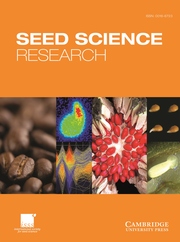Article contents
A hydrothermal time model of seed after-ripening in Bromus tectorum L.
Published online by Cambridge University Press: 19 September 2008
Abstract
Bromus tectorum L. is an invasive winter annual grass with seeds that lose dormancy through the process of dry after-ripening. This paper proposes a model for after-ripening of B. tectorum seeds based on the concept of hydrothermal time. Seed germination time course curves are modelled using five parameters: a hydrothermal time constant, the fraction of viable seeds in the population, base temperature, mean base water potential and the standard deviation of base water potentials in the population. It is considered that only mean base water potential varies as a function of storage duration and incubation temperature following after-ripening. All other parameters are held constant throughout after-ripening and at all incubation temperatures. Data for model development are from seed germination studies carried out at four water potentials (0, −0.5, −1.0 and −1.5 MPa) at each of two constant incubation temperatures (15 and 25°C) following different storage intervals including recently harvested, partially after-ripened (stored for 4, 9 or 16 weeks at 20°C) and fully after-ripened (stored for 14 weeks at 40°C). The model was fitted using a repeated probit regression method, and for the two seed populations studied gave R2 values of 0.898 and 0.829. Germination time course curves predicted by the model generally had a good fit when compared with observed curves at the incubation temperature/water potential treatment combinations for different after-ripening intervals. Changes in germination time course curves during after-ripening of B. tectorum can largely be explained by decreases in the mean base water potential. The simplicity and good fit of the model give it considerable potential for extension to simulation of after-ripening under field conditions.
Keywords
- Type
- Physiology
- Information
- Copyright
- Copyright © Cambridge University Press 1996
References
- 73
- Cited by


